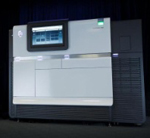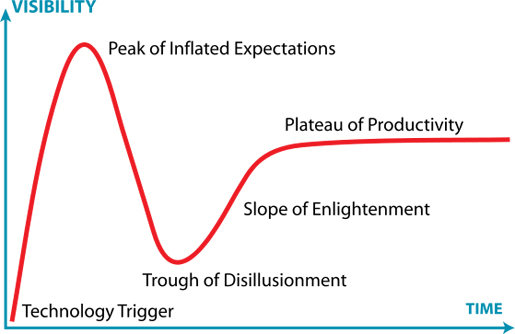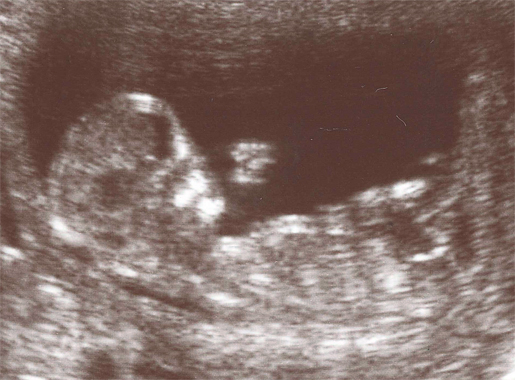Category: 23andme • commercial genetic testing • finance • personal genomics
Razib also notes some anonymous employee reviews of the company on GlassDoor suggesting poor morale among 23andMe workers; it's hard to make too much of these given their uncertain provenance, but
one of them is well worth a read.
In an economic environment where the sorts of disposable cash required for people to invest in luxury goods like personal genomics is scarce, DTC genetic testing companies were always going to have to work hard to stay afloat - and
the bankruptcy of 23andMe's competitor deCODE Genetics showed that this is no easy feat.
Razib also points to
a recent entry on Avey's blog warning of an impending NY Times article by reporter Andrew Pollack that will apparently cast a very negative light on the personal genomics industry. Avey launches a pre-emptive strike on Pollack, describing his impending piece as "a desperate attempt to make some headlines" and noting a growing number of anti-personal genomics stories in the mainstream press:
Read on »
Posted by Daniel MacArthur at 12:00 PM • 20 Comments
Category: agbt • complete genomics • conference blogging • illumina • next-generation sequencing • pacbio • pacific biosciences • solexa • solid • whole-genome sequencing
The main theme of this year's
Advances in Genome Biology and Technology meeting should come as no surprise to regular readers: sequencing. Generating as many bases of DNA sequence as quickly, cheaply and accurately as possible is the goal of the moment, and the number of companies jostling to achieve that goal is growing rapidly.
The meeting saw impressive performances from established players in the field, especially Illumina: their
new HiSeq 2000 instrument seems to have dug in as the platform of choice for generating vast amounts of high-quality short-read data. Life Technologies seem to be slowly abandoning the research genomics market (already dominated by Illumina) with their SOLiD platform, focusing instead on capturing the clinical sequencing market; they showed some impressive accuracy improvements for their technology.
As I mentioned in
my previous post, PacBio largely underwhelmed the audience with their theatrical unveiling of a massive box with quite limited applications, although we'll have to wait and see how much its specifications improve over the next couple of years. Meanwhile,
Complete Genomics gave an understated but seriously impressive series of presentations on their human genome sequencing service; I'll have more on them in a day or two.
Anyway, in this post I want to focus on the two brand new platforms announced in the emerging technologies session on the last day of the conference: the newcomer Ion Torrent, and Life Technologies' futuristic quantum dot technology.
Read on »
Posted by Daniel MacArthur at 11:00 AM • 0 Comments
Category: agbt • conference blogging • next-generation sequencing • pacbio • pacific biosciences • whole-genome sequencing

Stephen Turner from Pacific Biosciences gave a dramatic presentation this afternoon launching PacBio's new third-generation sequencing instrument. The room was packed for the seminar, with a palpable buzz, and Turner's presentation was preceded by a theatrical introduction from PacBio CEO Hugh Martin.
The presentation was overall impressive, but light on numbers - and in question time Turner was almost comically evasive on the issue of error rates (more on this below). No doubt
Luke Jostins will have some more technical details online soon, but here are my initial thoughts:
Read on »
Posted by Daniel MacArthur at 5:15 PM • 2 Comments
Category: agbt • conference blogging • illumina • next-generation sequencing • pacbio • pacific biosciences • solexa • solid • whole-genome sequencing
I've been remiss in blogging from the
Advances in Genome Biology and Technology meeting here in Marco Island, Florida, primarily due to some panic-stricken last-minute changes to the slides for my own presentation last night.
There have been some great presentations outlining both developments in genomic technology (read: next-generation sequencing) and applications of those technologies to biomedical research. A major highlight for me has been a number of presentations on exome sequencing (capturing and sequencing all of the protein-coding regions of the genome), especially
Debbie Nickerson's impressive outline of
her group's work using this technology to hunt down mutations underlying rare, severe Mendelian diseases, and her plans to apply the technology to over 7,000 samples over the next year to explore the genetic origins of more complex traits.
Exome sequencing is the technology of the moment because it provides access to the best-characterised functional regions of the genome at a substantially lower cost than whole-genome sequencing. However, it is not without its drawbacks: capture methods are still far from perfect, resulting in uneven coverage across the genome and resulting difficulties for downstream analysis, and of course the approach will miss any variants found outside coding regions.
Several speakers discussed cost-benefit analyses comparing exome sequencing with whole-genome sequencing; it's clear that this is a technology with a very limited lifespan (perhaps as little as twelve months) before sequencing costs drop to the point that whole-genome analysis is more cost-effective.
As always, much of the most interesting material at this meeting has been found outside the sessions, in the buzz and hype surrounding the increasingly crowded field of next-generation sequencing.
Read on »
Posted by Daniel MacArthur at 1:45 PM • 1 Comments
Category: agbt • complete genomics • conference blogging • next-generation sequencing • whole-genome sequencing
Now, on the eve of the meeting, the company
has announced that
it has orders booked for 500 more complete genome sequences. The press release also notes that the company successfully churned out a total of 50 sequences in 2009 for more than 10 customers.
These are impressive numbers for a company whose technology and business model - a unique "genome factory" approach in which its technology is deployed only in its own custom-built facilities rather than sold to genome facilities - were regarded with profound skepticism by many researchers in the AGBT audience last year. Will the company be able to meet
its stated target of 10,000 genomes (oops, I mean
5,000 genomes) this year? We'll see.
Anyway, I'm looking forward to seeing what else the company has to say in the presentation by its CSO
Rade Drmanac on Saturday.
 Subscribe to Genetic Future
Subscribe to Genetic Future.
Posted by Daniel MacArthur at 3:45 PM • 5 Comments
Category:
The
Genomes Environments Traits conference in Boston is without a doubt the place to be on April 27th for anyone interested in personal genomics: the conference has managed to attract nearly every human being in the world who has had their complete genome sequenced (excluding, of course, anonymous participants in the 1000 Genomes Project and various cancer studies), as well as
an impressive list of luminaries from the field.
Tickets are $999, but proceeds go to the
Personal Genome Project, a worthy cause. Attendance is limited to 200 participants, and I suspect you'd need to book pretty quickly to be assured a slot.
Unfortunately I won't be able to attend myself, but I'll be keeping a jealous eye on the Twitter buzz and watching out for the promised webcasts.
Read on »
Posted by Daniel MacArthur at 11:30 AM • 2 Comments
Category:
My wife and I have embarked on our first collaborative genetic experiment:
 Subscribe to Genetic Future
Subscribe to Genetic Future.
Posted by Daniel MacArthur at 5:30 PM • 29 Comments
Category:
A reader pointed me to
this article in the Australian news: it appears that a major Australian insurance company, NIB, is planning to offer half-price genome scans from personal genomics company Navigenics to 5,000 of its customers.
The catch is in the fine print: those who take up the offer "may have to give the information to life insurance or superannuation providers", according to the article. In a letter to customers, the chief executive of the company explicitly says that this information could be used to alter the premiums people pay for their life insurance:
Read on »
Posted by Daniel MacArthur at 1:15 PM • 5 Comments
Category: commercial genetic testing • counsyl • decode genetics • decodeme • finance • personal genomics
This piece in Newsweek is a neat summary of the rise and fall of Icelandic genomics giant
deCODE Genetics. Regular readers of Genetic Future will be aware that the company has been steadily bleeding capital ever since its launch over a decade ago, and
recently declared formal bankruptcy. Since then the company has been bought up by US-based company Saga Investments. (For an excellent analysis of the implications of this sale, see
Dan Vorhaus' post on Genomics Law Report.)
A reader emailed me to point out that buried towards the end of the Newsweek article is an ominous paragraph for customers of the company's personal genomics arm, deCODEme. Despite
earlier promises that the personal genomics service will be continued, the article gives the strong impression that the days of the service are well and truly numbered:
Read on »
Posted by Daniel MacArthur at 9:45 AM • 4 Comments
Category: blog admin
Blogging on Genetic Future will be pretty much non-existent for the next three weeks.
Posted by Daniel MacArthur at 6:00 PM • 2 Comments


 Stephen Turner from Pacific Biosciences gave a dramatic presentation this afternoon launching PacBio's new third-generation sequencing instrument. The room was packed for the seminar, with a palpable buzz, and Turner's presentation was preceded by a theatrical introduction from PacBio CEO Hugh Martin.
Stephen Turner from Pacific Biosciences gave a dramatic presentation this afternoon launching PacBio's new third-generation sequencing instrument. The room was packed for the seminar, with a palpable buzz, and Turner's presentation was preceded by a theatrical introduction from PacBio CEO Hugh Martin. 